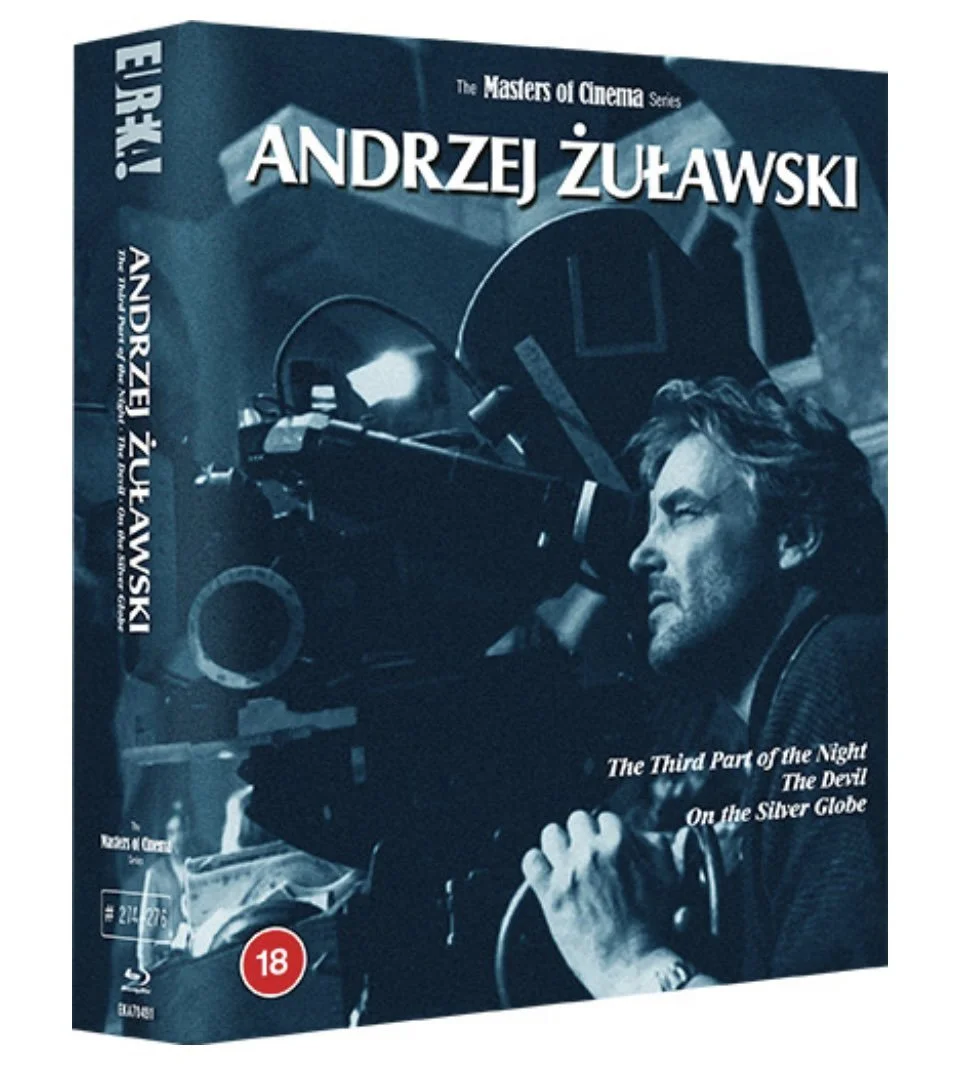Andrzej Żuławski│Eureka Entertainment
by JAMES CAMERON-WILSON
Last week saw the release of a box-set of the works of Andrzej Żuławski. Until now, I had only seen Żuławski’s one English-language film, Possession, for which Isabelle Adjani won the best actress award at Cannes – but that was back in 1981. Here, Eureka Entertainment, as part of their Masters of Cinema series, are releasing a four-disc set comprising Żuławski’s first film, The Third Part of the Night, along with the controversial The Devil, 1988’s On the Silver Globe (shot in 1977) and Kuba Mikurda’s 2021 documentary on the making of On the Silver Globe, namely Escape to the Silver Globe. And on top of this there is the usual excellent bonus material, interviews with the astonishingly well-informed film historian Michael Brooke, interviews with Lukas Żuławski and Adam Żuławski and a limited edition 60-page collector’s booklet.
In brief, Poland’s André Żuławski was born in Lviv (now Ukraine) in 1940, studied philosophy at the Sorbonne in Paris before becoming an assistant to Andrzej Wajda, Poland’s past master, and hung out with Roman Polanski, yet another Polish great. Żuławski’s first feature was a violent reaction to the mainstream and, considering that it was released back in 1971, is extraordinary. Its discordant OTT score – with a heavy reliance on the xylophone –nails it to its period, but in most other senses The Third Part of the Night is way ahead of its time. Michael Brooke describes it as “a hallucinogenic nightmare”, which pretty much sums it up, and the influence of the French New Wave is evident, particularly early Godard. But really it is its own animal and considering some of the scenes of violence, it completes the unholy quintet of 1971 – Soldier Blue, Straw Dogs, A Clockwork Orange and The Devils being the other four – when the Swinging Sixties gave way to the most creatively productive decade of the cinema up to that date: the 1970s.
This is the first time that The Third Part of the Night, The Devil and On the Silver Globe have been available on Blu-Ray in the UK and they are exquisitely restored. What is so effective about Żuławski’s first film, which is set in Poland during the Nazi occupation, is that initially the violence is very stylised, but none the less upsetting for that. Yet as the story progresses, the carnage becomes more fleeting but far more graphic, making a film like Bonnie and Clyde, which caused a headache for the censor, seem quite quaint in comparison. And Żuławski doesn’t always make it clear who is committing the violence, as there are double agents as well as members of the Resistance and in war anybody can die at the hands of anybody. War is hell and death lies around each corner. Our hero is Michal (Leszek Teleszyński), who is driven mad by witnessing the murder of his son, his mother and his wife as soldiers ride into his house and for no apparent reason gun down the inhabitants. Then, alongside the more surreal passages, there are a series of scenes which are very detailed in their naturalism. Here, Michal volunteers his blood for a series of scientific experiments to create a vaccine against typhus, in which he freely allows lice to feed off his legs.
Apparently, these sequences are very accurate in their depiction and as the film’s colour palette drains to a virtual monochrome, so the pallor of Michael’s cheeks drain of any colour as he becomes more and more anaemic. There’s also an astonishingly realistic child birth, with the camera largely focused on the mother’s face, who bears a striking resemblance to Michal’s late wife. There’s a lot to take on board here as the madness of war and the cruelty of the occupiers unsettles the viewer in a way that most war films come nowhere close in portraying.
Andrzej Żuławski: Three Films is now available on Blu-ray from Eureka Entertainment: https://eurekavideo.co.uk/movie/andrzej-zulawski-three-films-limited-edition-box-set/
Eureka Entertainment is the leading independent distributor of classic silent/early films in the UK. In 2004, Eureka! established the award winning Masters of Cinema Series, a specially curated director-led Blu-ray and DVD collection of classic and world cinema using the finest available materials for home viewing. In 2014, Eureka! established Eureka! Classics intended to highlight a broader selection of classic and cult cinema, and in 2017, Eureka! established Montage Pictures, a label celebrating ground-breaking and thought-provoking world cinema from new and upcoming directors.

